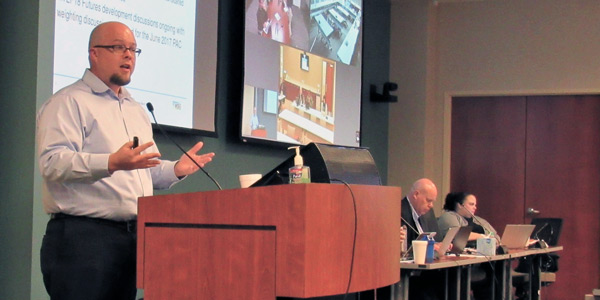By Amanda Durish Cook
CARMEL, Ind. — The futures assumptions for MISO’s 2017 Transmission Expansion Plan are finalized, with the RTO granting its South region a different future weighting in one study.
MISO will use a 40% weighting for an existing trends future, 40% for policy regulations future and 20% for accelerated alternative technologies when conducting its market congestion planning study, which this year is focused solely on MISO South. The other studies in MTEP 17 will continue to use a 31% weighting for existing trends, 43% for policy regulations and 26% for accelerated alternative technologies.
The RTO revisited the weighting in February in response to a request from stakeholders who noted the Trump administration’s plan to eliminate the EPA Clean Power Plan. (See MISO Stakeholders Seek Review of MTEP Futures Under Trump.)
“We went through a presidential election that changed a lot of things,” MISO Director of Policy Studies J.T. Smith said at a March 15 Planning Advisory Committee meeting. “There were some concerns that, given the political climate, maybe the futures — developed in mid-2016 — didn’t quite reflect what the current situation is.”
Smith said the revisions are meant to reflect regional differences within MISO; he pointed out that MISO South transmission owners and the state regulators of southern states all asked for more emphasis on existing trends.
Both the Louisiana Public Service Commission and Arkansas Public Service Commission asked for existing trends to be given 50% consideration while policy regulations and accelerated alternative technologies receive 30% and 20% weighting, respectively. Entergy went a step further to request a 60% likelihood for existing trends, 25% for policy regulations and 15% accelerated alternative technologies.
All other MISO stakeholders that commented on futures weighting — including MISO’s coordinating, environmental and transmission developer sectors, the Iowa Utilities Board, the Indiana Utility Regulatory Commission, the Minnesota Public Utilities Commission, the Minnesota Department of Commerce, Big Rivers Electric, Midwest Power Transmission Arkansas and WPPI Energy — urged MISO to leave weighting as is.
“When we saw that regional separation, we realized that maybe there needs to be a change this year,” Smith explained, adding that the near-term nature of the market congestion planning study can better absorb a change in weighting and not affect other longer-term planning. The study is designed to identify projects to relieve congestion.
Going forward, Smith said he’d like to focus more on the probability that the generating fleet will change regardless of potential federal policy shifts. Development of MTEP 18 futures will begin at the June Planning Advisory Committee meeting, and Smith said it’s unlikely that MISO will allow divergent weightings in the next MTEP cycle.
“I still think we’re going through fleet change,” said Smith, who also admitted that “it’s uncomfortable when you change assumptions halfway through.”
Smith also said MTEP 17 weights would not change in MISO’s footprint diversity study, which is specifically designed to identify alternatives to using SPP’s transmission interface for flows between MISO South and MISO Midwest.
Some stakeholders said that conducting one MTEP study using separate future weighting is inconsistent. Others asked how MISO arrived at the altered weights. Smith said the RTO only considered comments from southern stakeholders when creating the new percentages and did not use any mathematical calculations.
Xcel Energy engineer Drew Siebenaler pointed out that most stakeholders that submitted comments on the futures supported leaving them as is. Noting that all MISO stakeholders pay for the MTEP process, he said MISO South should fund its own study if it wants to handpick assumptions.
Smith said Siebenaler’s concerns were valid and that MISO would work to improve the futures weighting process in the future.
Meanwhile, Arash Ghodsian, of MISO’s economic studies department, said the footprint diversity study and the market congestion planning study continue on track, with project candidates emerging in June. He said stakeholders submitted 58 project ideas for the market congestion planning study.





